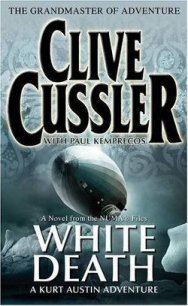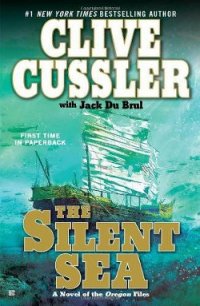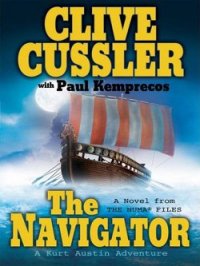Lost City - Cussler Clive (читать онлайн полную книгу .txt) 📗
"Sounds as if the brass wasn't anxious to stir things up," Austin said.
"Exactly my impression," Mayhew said. "Talked to the relatives and learned that all the dead men had formerly worked for the same research lab."
MacLean's former employer?" Trout said.
"That's right. When we couldn't find MacLean we assumed he had met an untimely end or had something to do with the deaths of his colleagues. Now here he turns up on your island, dead unfortunately, thereby establishing the connection to the lab."
Trout leaned forward in his chair. "What was the nature of the research?"
"They were supposedly doing research into the human immune system at a facility in France. It was apparently a subsidiary of a larger, multinational corporation, but they did a good job of hiding ownership in layer after layer of straw companies, dummy corporations and overseas bank accounts. We're still trying to trace the line of ownership."
"And if you do, you'll charge them with murdering those scientists," Austin said.
"That's the least of it," Mayhew said. "From Dr. Trout's account, it seems that the work they were doing created those mutants and condemned them to a living death."
"Let me sum up what we have so far," Austin said. "This lab employs scientists to work on a project to come up with the so-called Philosopher's Stone, an elixir based on ocean enzymes from the Lost City. The scientists are apparently successful in producing a formula that prolongs life, thereby ensuring their own premature deaths. Ma cLean escapes, but is brought back to lead a reconstituted scientific team to correct flaws in the formula. Flaws that produce awful mutations. Paul blunders into their mining operation and is drafted to work in their lab."
"The pieces fit together like clockwork," Mayhew said. "May I ask you a question, Mr. Austin? Why didn't you contact the British authorities immediately with this information?"
"Let me answer that with a question of my own. Would you have believed me if I showed up at your door raving about red-eyed fiends?"
"Absolutely not," Mayhew said.
"Thanks for being honest. You must know that it would have taken time going through regular channels. We felt that any delay might be fatal. Paul Trout is a friend as well as a colleague."
"I can understand that. As I said, I'm acquainted with the work of your Special Assignments Team and know you were probably more than up to the task. I had to ask you the question because my superiors would ask it of me."
Gamay said, "Is anyone in your government going to investigate the island?"
"A naval ship is on its way," Mayhew said. "It's carrying a contingent of Royal Marines who will be sent ashore. They'll attempt to find this submarine, seal off the labs, and neutralize the guards and these mutants."
"From what I saw, I doubt you'll find much left of the guards," Trout said.
There was a moment of silence as Trout's words sank in, then Mayhew said, "You had the most experience with these mutants, Dr. Trout. What was your impression?"
"They are savage, cannibalistic and incredibly strong. They are able to communicate, and judging from their raid on the Outcasts island, they can plan." He paused, thinking about his encounter with the mutant in the Zoo. "I don't think their essential human qualities have all been eliminated."
Mayhew replied with an enigmatic smile. "Fascinating. I think we're done here, but I wonder if you could spare a few more minutes. I have something of interest I'd like to show you."
Mayhew led them through a labyrinth of corridors until they came to a chilly room that had been set up as a medical examiner's lab. A plastic sheet covered a form that lay on a metal table illuminated by a spotlight. A middle-aged man in a white lab coat was standing next to the table.
Mayhew signaled the man and he pulled the sheet back to reveal the ravaged face of the red-eyed creature that had been shot aboard their boat. He didn't seem so terrible with his eyes closed. His face had lost its permanent snarl and seemed more in repose.
"A little rough around the edges," Mayhew said. "Not bad-looking for a Frenchman."
"Are you displaying your Anglo bias or do you know for a fact that he's French?" Austin said.
Mayhew smiled and reached into his pocket, producing a thin metal tab with a chain attached. He handed the object to Austin. "This was around this gentleman's neck. It's a little timeworn, but you can read the writing." .
Austin held the tab under the light and read the words: Pierre Levant Capitaine, L'Armee de la Republique de France, b. 1885.
"Looks like our friend here stole someone's dog tag."
"I had the same thought at first, but the tag actually belongs to this chap."
Austin responded with a quizzical look. Mayhew was not smiling as he would if he meant the wild assertion as a joke.
"That would make him more than one hundred years old," Austin said.
"Close to one hundred and twenty, to be exact."
"There must be some mistake. How can you be sure this is the man whose name is on the dog tag? Millions of men were lost during World War One."
"Quite true, but the armies did a tolerably good job of keeping records despite the chaos. Men were often identified by their comrades or officers. As the fighting moved on, bodies were cleared by special units and the director of graves registration took over, aided by the unit chaplain. There were cemetery maps drawn, information filtered through a casualty clearing station, hospitals and grave registrations and so on. That information has been put on a computer. We learned that there was a Pierre Levant, that he served as an officer in the French army and that he disappeared in action." "A lot of men disappeared in action."
"Oh, you skeptical Americans," Mayhew said. He reached into his suit and pulled out a pocket watch, which he handed to Austin. "We found this in his pocket. He was quite a handsome devil at one time."
Austin examined the inscription on the back of the watch. "A Pierre, de Claudette, avecamour." Then he flipped the watch open. Set into the cover was a picture of a young man and woman.
He showed the watch to the other members of the NUMA team. "What do you think?"
Gamay examined the tag and the watch. "One of the first things I learned in marine archaeology was the importance of establishing provenance. For instance, a Roman coin found in a Connecticut cornfield could mean that a Roman had dropped it, but it's just as likely the source was a Colonial-era coin collector."
Mayhew sighed. "Perhaps Dr. Blair can convince you." "I didn't believe it either," said the white-frocked pathologist. "We did an autopsy on the gentleman. The cells in this individual are comparable to those of a man in his late twenties, but the brain sutures, the joints of the skull, indicate the gentleman is " He cleared his throat. "Ah, more than a hundred years old."
"That would mean the work on the life extension formula goes back much further than we've assumed," Austin said.
"An incredible yet reasonable assumption," Mayhew said. "There
were rumors during World War One of attempts to develop a
"berserker," a super-soldier of sorts who would charge enemy trenches in the face of fierce fire."
"You're thinking that it's related to the life extension research?" "I don't know," Mayhew said. He drew the sheet back over the creature's face.




